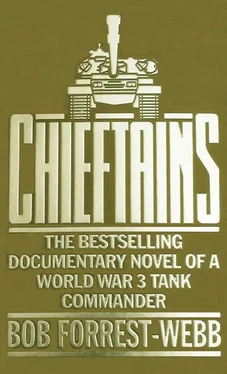There was wreckage.
'Russian T-60,' said Podini, dryly. He moved the turret a couple of degrees to bring the wrecked vehicle to the centre of the lens, then checked the range with the laser. 'Two thousand six hundred meters.'
'Okay, go on some more.'
The turret revolved slowly, then stopped. 'XM1…an Abrams.' There had been no change in the tone of Podini's voice; it was flat, mechanical. 'Two thousand nine hundred meters.'
'Confirmed.' The hull of the squadron's Abrams was torn open at the side, exposing the still-smoking fighting compartment.
'It's Idaho.' There was more emotion with Podini's recognition of the vehicle.
'How the hell can you know that?'
'It's Idaho…Acklin's wagon…you think I'm dumb?' Podini's voice level was rising.
'Okay, okay. Take it round again.'
In the next two minutes they identified nine more of the squadron's XM1s. There were other wrecks, too far away for either of them to be certain they belonged to friends or enemy. And no living thing moved on the battleground.
'He always has to be first,' Podini complained loudly and bitterly. 'Adams has to be first every time. Adams, why the hell you want to be first, always up-front? Why aren't you last sometime, like ordinary people?'
'Fuck off, Pino. I only drive to order.'
Browning knew that the squadron's counterattack had failed, destroyed by the power of the Russian barrage from across the river in East German territory, and from Soviet positions ahead of the US armour. What little smoke there had been was no protection against the BM21 rockets fired from behind the border where they had obviously been deployed in battalion groups capable of landing more than seven hundred missiles on a square kilometer of ground in twenty seconds. Coupled with conventional artillery fire, it had blanketed the area occupied by the XM1s and their support. Shell and rocket craters were so close together in places on the battlefield that they overlapped. Sometime, while Browning's XM1 had been grinding its way through the inferno, jinking the shell explosions with its crew deafened by the howls and shrieks of the missiles, the radio useless with interference and jamming, there must have been an order for the survivors to withdraw. He hadn't heard it.
'I guess we're up to our eyeballs in shit,' commented Hal Ginsborough.
Adams called up from the driving position, 'Well, at least we ain't dead!'
'But you tried, man, you sure tried,' taunted Podini.
The Podini versus Adams duelling didn't bother Browning; it was part of the two men's friendship. It worried outsiders who didn't understand that it was an essential feature of their communication process. Only a few days previously, Adams had rescued Podini from a bar fight that developed when a black artillery corporal had tried, uninvited, to defend Adams' dignity.
'I'm going outside to have a look around,' Browning told his crew. It seemed to him Utah was situated in the calm eye of a tornado, and at any minute it would be swirled back into the violence. The peace was surely artificial. There should be Soviet patrols pacifying the area, their battlefield police taking charge of prisoners, engineers recovering tanks and vehicles for' the workshops. He could only think the Soviet bridgehead had been far stronger than the intelligence information had led Divisional Command to believe, and that when the main thrust of Soviet armour across the river had remained undeflected by the abortive counterattack to its flank, then it had continued to follow their commander's original orders and attack route. Soviet tactics tended to be inflexible. He tried to guess at their objective; the city of Fulda and the multiple highway linkage were almost due west, and possibly their first Red. 'Mike, Hal, both of you stay inside here. Keep out of sight. Pino, get your sidearm and come with me.'
Browning didn't enjoy being outside his tank in combat zones. There was security in thick steel, even if the infantry referred to tanks as 'Ronsons' and swore they would rather fight as smaller and less inflammable targets out in the open. Now, as he began climbing the hill through the stumps of the torn woodland, he felt vulnerable and defenceless; the Remington automatic pistols which he and Podini came. were poor substitutes for Utah's powerful weapons.
Much of the low hill had been scalped by artillery fire, but there was some protection close beneath the limestone outcrops. Near the top he paused and looked back across the battlefield. The ridge of forested hills which had been the squadron's earlier position were eight kilometers to the south and were still hidden by smoke drifting above the ruins of Gunthers. It seemed impossible Utah could have survived the barrage which had destroyed many tanks. He counted thirty wrecked vehicles, and realized there would be more south of the village. It was no longer simply a question of repairing the XM1 to get her back to the regiment, but a matter of survival for the crew and himself…he couldn't see how they would make it.
He moved cautiously, avoiding the skyline and working his way past the blazing remains of the Soviet T-62 until he found better cover in a gorse thicket on the ridge.
Podini was staying so close that when Browning hesitated the gunner crawled into him. He signalled for him to wait while he slid himself on his belly for the last meter.
He caught his breath as he pushed aside the gorse. A regiment of Soviet armour had reformed on the farmland below him less than two thousand meters away. Thirty or forty tanks, T-80s and T-60s. Beyond, a battery of self-propelled guns; nearby, three rows of armoured personnel carriers. The tanks were moving, swinging away westward, the roar of their engines drowning out the sounds of battle. The river, six hundred meters to the right, had been bridged by a pair of GSP ferries, and field engineers were already constructing a second bridge fifty meters downstream, protected by two Quad self-propelled anti-aircraft vehicles and an SAM battery, lightly camouflaged near the riverbank. There was no doubt the Soviet commanders had anticipated their rapid advance, for there was already a queue of vehicles waiting to cross; heavy cargo carriers, pillow tanks loaded with fuel, artillery tractors and their guns.
How far had they advanced in the hour or two since the first dawn battle had started? Browning studied his watch, wondering for a moment if it had been damaged. It showed 16.30 hours. Noon had passed unnoticed…eleven hours since it had all begun! His mind was momentarily confused. They called it battle amnesia didn't they? The real and the unreal blended together, time compacted and loot, incidents jumbled. It was the reason pilots were debriefed the instant they landed; minutes law, as their minds relaxed after long, intense concentration, the memories were no longer accurate.
Ten hours; almost eleven. The Soviet spearhead could already be twenty kilometers into NATO territory, now they had penetrated the defences…perhaps even further. He remembered Captain Harling's words: 'We're about to counterattack their flank.' Flank! Had the captain lied? Was it an attempt by the squadron to break out of their encircled position…an attempt which had failed? The amount of materials the Russians were accumulating east of the river seemed to indicate they felt the bridgehead was secure, and for the first time that day Browning could see no NATO aircraft in the skies above.
Podini was waiting nervously, his Remington so tightly gripped in his hand the knuckles were white, his body pressed hard beneath the gorse.
'What did you see?'
'Half the Commie army. The best part of a full tank regiment, artillery and logistics. The whole darned lot down there in the fields…bridges, combat engineers.'
They returned to the Abrams by a more direct route down the cratered slope. The plain towards Gunthers where the carcasses of the squadron lay had the air of a bone-yard about it, reminding Browning of photographs he had seen of drought-sticken African deserts scattered with the dry skeletons of dead animals. For once Podini was silent, keeping his thoughts to himself as they scrambled down the hillside.
Читать дальше












